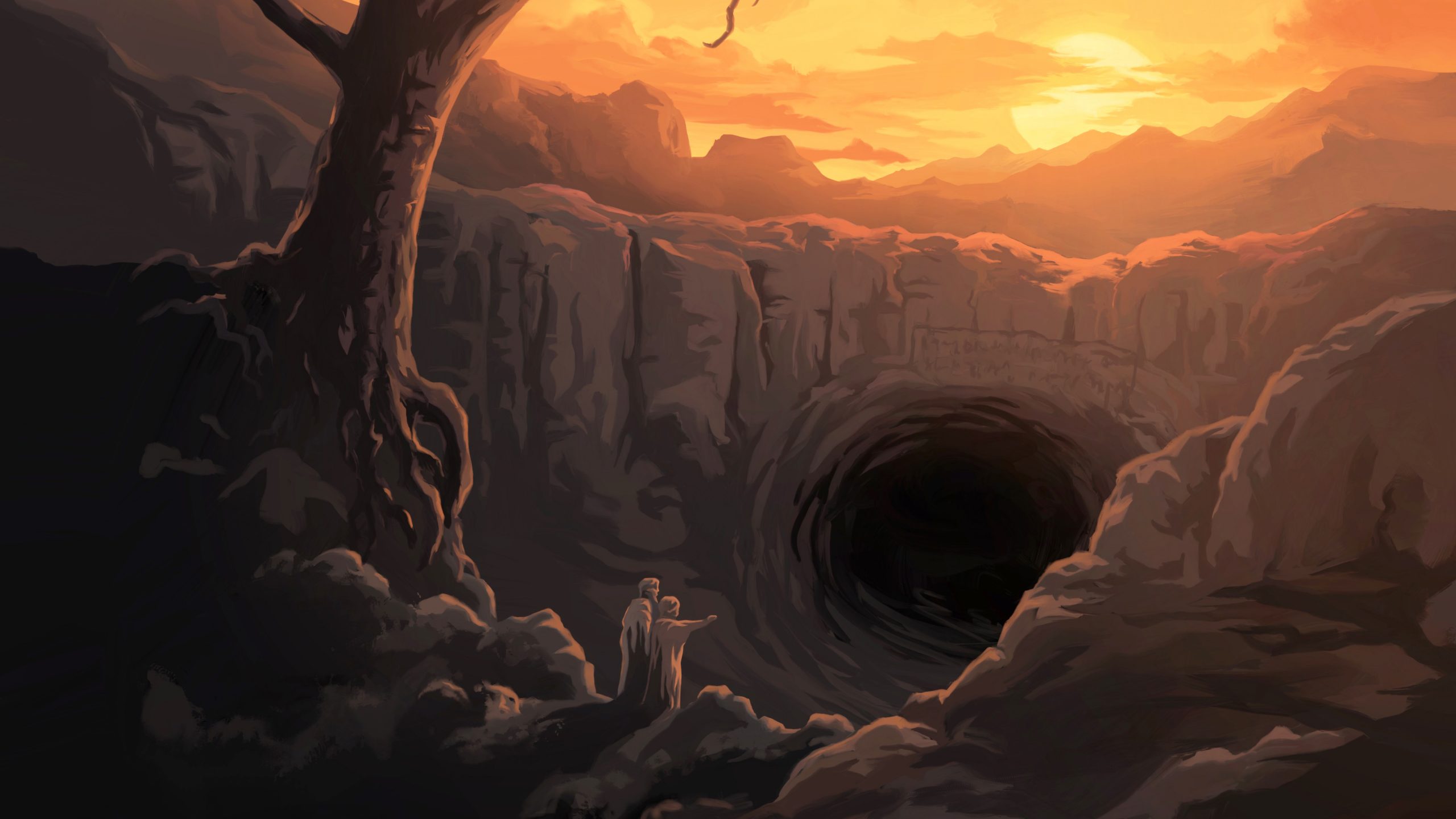
DANTE AND HOLY WEEK
The Mighty Power of Good Friday
Joe Carlson
According to Dante’s vibrant imagination, Hell is a ramshackle kingdom, broken and falling apart. As the pilgrim journeys through the terrible realm, he sees on every side ruin and decay, and not only in the faces of the damned. The very landscape is full of craggy landslides, crumbled towers, broken bridges, and wreckage. As the downward journey continues, it becomes more and more obvious that the city of Dis, named for the archfiend, was once a staggering achievement, something akin to Milton’s Pandemonium. But now it is a Pandemonium gone wrong. Everything is in shabby disrepair. As the travelers descend from the sixth circle to the seventh, the poet gives us this description:
Like the landslide that wrecked the Adigè in its flank, on this side of Trent, either from an earthquake or failing foundations, and so shattered the cliff, from the summit of the mountain whence it moved to the plain, that somehow one from above could come down; such was the broken face of that abyss… Thus we made our way down through the ruin of those rocks, the same ones that were shifting underneath my feet from their new burden. (Inferno 12.4-10, 28-30)
The Adigè is a river that runs through the region between Trent and Verona in northern Italy. There is a spot about 20 miles south of Trent where the cliffs are so high and brittle they often crumble and fall down into the river, destroying everything in its path. This is the image the poet Dante has in mind when describing the ruin of Hell. And again, it was not always so. Something has happened to disrupt and destroy the proud magnificence of that realm of darkness and death. In the following verses, Virgil gives us a hint. He says,
Now I want you to know the other time I was here, going down into Deep Hell, this cliff had not yet fallen to pieces. But certainly, if I rightly discern, just before He came and removed from Dis the great spoils there in the highest circle, every rock of the deep and vile valley trembled… it was at that moment this ancient cliff, here and elsewhere, crumbled down to rubble. (Inferno 12.34-41, 44-45)
The “He” in line 38 is none other than Jesus Christ, descending into Hades to lead forth on high “a host of captives” (Ephesians 4:8). This is the second reference to the Harrowing of Hell, the ancient tradition in which Christ plundered Hades (the place of the dead), taking to Paradise the souls of all those who believed in the promise and looked forward to His coming. Earlier, in Canto 4, Virgil describes the Harrowing this way:
“I was newly come to this condition when I saw a Mighty One descending, crowned with the token of His victory. He led forth the shade of our first father… (Inferno 4.52-55)
The Roman poet goes on to name many of the Old Testament saints, from Abel and Noah to Abraham and David. Shortly after Virgil arrived in first circle, Jesus, the Mighty One, so named because Dante will not allow the holy name of the Son of God to be polluted by the putrid fumes of Hell, rescued his beloved from the land of the dead, ascending with them to the eternal joy of the Father’s presence. But when did this happen? What was the occasion of this tremendous event?
On the morning of the second day of the journey, which also happens to be Holy Saturday in the year 1300 AD, the pilgrim and Virgil, looking for a bridge to cross over the sixth ditch of Malebolge, come across a troop of demons. Their chief explains why the closest bridge is now impassable:
Yesterday another five hours after this one, were twelve hundred sixty six years completed since this way was shattered into pieces. (Inferno 21.111-114)
What is the demon lamenting? 1266 years and one day before this moment, Jesus hung on the cross and died. And His death on that first of all good Fridays shook the very foundations of Hell, trampling down death by death. When He died, the city of Dis broke apart, the mountains of Hell were crushed, and its very infrastructure was destroyed. Hanging on the cross, Jesus did not just atone for our sins, though He did do that. He did not just reconcile us with the Father, though He did do that. He did not just rescue from the land of the dead the saints who waited patiently for His coming, though He did do that. In dying on the cross, Jesus destroyed the very power and force of death, shattering into pieces the way of Hell forever. Death is now a ramshackle kingdom, unable to keep hold on those for whom Jesus died. The power of the cross is the power that destroys death forever, the power that turns Hell on its head. And the gates of death will not prevail. For Jesus holds the keys. He alone has authority over the city of Dis. He alone can open and shut.
Therefore, today, when you look upon the brokenness of your savior on the cross, giving His life for you, see in His brokenness the ruin of death, the ruin of the Old Man, the ruin of your former self; see in his gasping the final gasps of Hades. See the Mighty One, dead in the flesh but alive in the spirit, descending, crowned with the token of His victory, the crown of thorns fit for a king, leading you forth from the domain of death and into the kingdom of His everlasting light. Forever. This is the mighty power of Good Friday. This is why this Friday is Good.
More from Joe Carlson
- More Articles by Joe Carlson
- Dante’s Divine Comedy – a new translation, with reader guides by Joe Carlson
- The Dante Curriculum

Joe Carlson (MA Humanities) lives in the DFW metroplex with his wife and son. He received his BA from New St Andrews College, and his MA from the University of Dallas, where he is currently completing his doctoral studies. His thesis explored and unpacked a specifically doxological pedagogy, based on Dante’s educational projects. He has managed a chain of coffee shops, published (micro) epic poetry, co-pastored a church, helped create and staff a university campus ministry, written for the Salvo Magazine blog, and taught many different kinds of classes over the years. It was a passion for the medieval cosmology enjoyed by C.S. Lewis that eventually brought him back to an ever deepening love for the Divine Comedy.